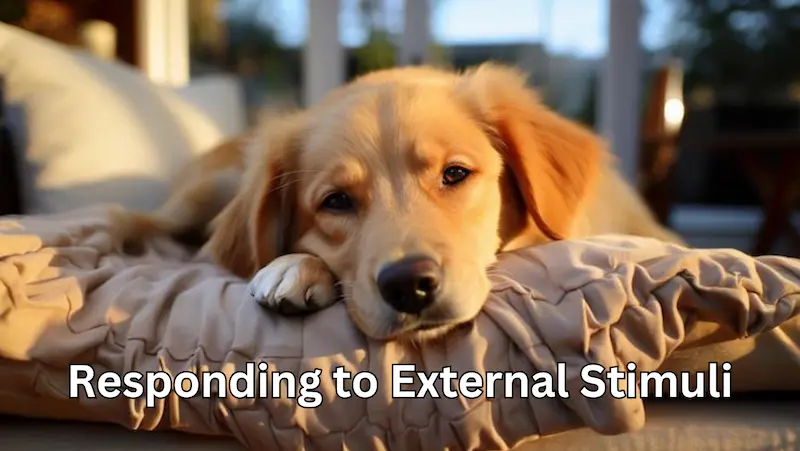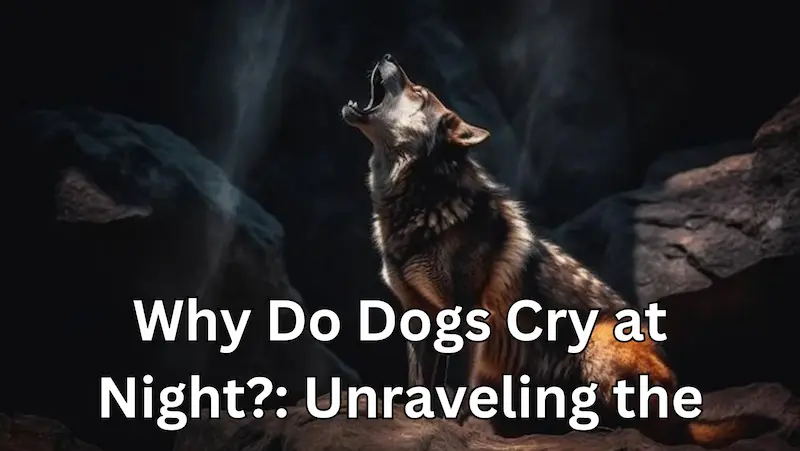Why Do Dogs Cry at Night: In the previous section, we discussed the various reasons why dogs howl at night, ranging from ancestral instincts to loneliness and boredom. Now, let’s delve deeper into each of these factors and explore effective strategies to manage and reduce nighttime howling.
1. Fulfilling Their Ancestral Instincts
Understanding that howling is deeply rooted in a dog’s ancestry is the first step in addressing this behavior. While we can’t change their instincts, we can provide alternatives for their communication needs:
- Companionship: If your dog’s howling seems driven by a desire for connection, ensure they have plenty of quality time with you during the day. Engage in interactive play, cuddling, or a relaxing evening walk before bedtime.
- Playdates: If your dog enjoys the company of other dogs, consider arranging playdates with a neighbor’s dog or visiting a dog park. Social interaction can fulfill their pack instincts.
2. Tackling Loneliness and Separation Anxiety
Loneliness and separation anxiety often lead to nighttime howling. Here’s how you can address these emotional needs:
- Create a Comforting Environment: Make your dog’s sleeping area as comfortable and inviting as possible. Provide a soft bed, favorite toys, and a worn piece of your clothing that carries your scent.
- Gradual Departures: If separation anxiety is an issue, practice short departures and gradually increase the time you’re away. This helps your dog become more accustomed to being alone.
3. Battling Boredom


To combat nighttime howling borne out of boredom, keep your dog mentally and physically engaged:
- Daily Exercise: Ensure your dog gets ample exercise during the day. A tired dog is less likely to engage in restless howling at night.
- Interactive Toys: Use puzzle toys and treat-dispensing toys to keep your dog mentally stimulated. These toys can provide hours of entertainment.
- Training and Commands: Engage your dog in short training sessions throughout the day. Mental exercise can be just as tiring as physical activity.
4. Responding to External Stimuli
To manage howling triggered by external stimuli, consider the following:
- Limit Exposure: If sirens, wildlife, or other dogs are causing the howling, try to limit your dog’s exposure to these triggers. Keep windows closed at night or use white noise machines to drown out external sounds.
- Behavior Training: Train your dog to respond to commands like “quiet” or “enough.” Reward them when they stop howling in response to a trigger.


5. Medical and Emotional Concerns
If your dog’s howling is linked to underlying medical or emotional issues, consult with a veterinarian or dog behaviorist for guidance:
- Vet Check: Ensure your dog receives regular check-ups to rule out any medical conditions that could be causing discomfort or distress.
- Behavioral Therapy: If separation anxiety, fear, or other emotional issues are at the root of the howling, a professional dog behaviorist can help with behavioral therapy and training.
6. Gradual Desensitization
For dogs sensitive to specific stimuli like storms or fireworks, you can use a technique called gradual desensitization. This involves exposing your dog to the trigger in a controlled and non-threatening way, gradually increasing their tolerance over time.
7. Professional Guidance
If your dog’s howling persists despite your efforts, consider seeking professional guidance. A certified dog trainer or behaviorist can conduct a thorough assessment and develop a customized plan to address the behavior effectively.
Conclusion
Understanding why dogs howl at night is the first step toward managing and reducing this behavior. Whether it’s fulfilling their ancestral instincts, addressing emotional needs, battling boredom, or managing external stimuli, there are numerous strategies you can employ to create peaceful nights for both you and your furry friend.
Remember that patience, consistency, and a deep understanding of your dog’s unique personality are key to resolving nighttime howling. With the right approach and a little guidance, you can enjoy restful nights and a stronger bond with your beloved canine companion.
Why Do Dogs Cry at Night?
FAQ
Q1: Why do dogs howl at night?
Dogs howl at night for various reasons. It could be due to loneliness, anxiety, response to external sounds, or even an expression of their instincts. Understanding the specific cause can help in addressing the howling behavior.
Q2: How can I stop my dog from howling at night?
Stopping nighttime howling requires identifying the underlying cause. Depending on the reason, you may need to provide more companionship, create a comfortable sleeping environment, offer mental and physical stimulation, or use training techniques to teach your dog to be quiet on command.
Q3: Is nighttime howling a sign of separation anxiety?
Yes, excessive howling at night can be a sign of separation anxiety in dogs. If your dog displays signs of distress when you leave and howls excessively when alone, it’s essential to address this anxiety through gradual desensitization and counterconditioning techniques.
Q4: Should I ignore my dog’s howling at night?
Ignoring your dog’s howling can be an effective approach if the behavior is attention-seeking. However, it’s crucial to rule out other causes like discomfort or anxiety. Ignoring howling due to anxiety may exacerbate the problem, so consult with a professional if needed.
Q5: Can certain breeds be more prone to nighttime howling?
Yes, some dog breeds are more prone to howling due to their ancestral traits. Breeds like Siberian Huskies, Alaskan Malamutes, and Beagles are known for their vocal nature. While breed tendencies play a role, individual variation exists, and proper training can help manage howling behavior in any breed.

